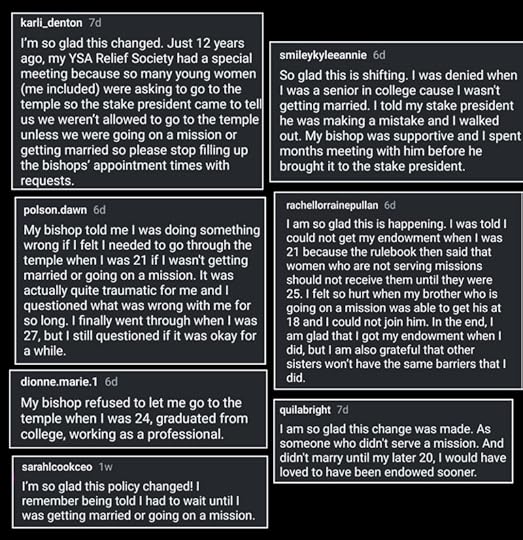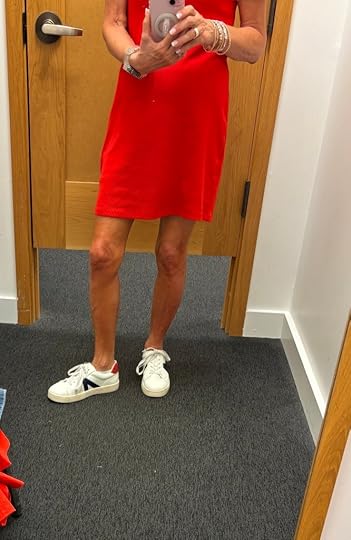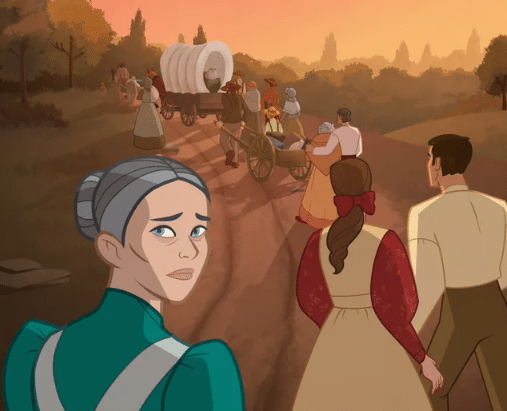Exponent II's Blog, page 24
June 2, 2025
Guest Post: Wait, what?! Shifting Endowment Requirements for Young Women
By Emily

I recently saw an Instagram post on the official Relief Society account. It was a “Wait, what?!” moment as they explained the four requirements for a young woman to receive her endowment. #1 Be at least 18 years old. #2 Completed high school or equivalent. #3. Have been confirmed a member for at least one year. #4. Have a desire to receive your endowment. They specifically mention that you do not need to be going on a mission or be getting married to receive your endowment. WAIT! WHAT?
I started at BYU in 1997. As a young adult, I had big decisions looming in my near future. I was doing a lot of soul searching. I prayed, read my scriptures, served faithfully, and attended all of my weekly meetings. I’d always known that the temple was a place to receive revelation, so I sought refuge there. I had a limited use recommend. I was able to enter the temple, but only to do baptisms.
After many temple visits, tears, and pleading with God for guidance, I knew it was time for me to receive my endowment. I was almost 20 years old. Many girls around me had gotten married and had had their endowment for two years already. I met with my bishop and told him that I was ready to go to the temple. The first thing he said to me was, “Oh, you’re engaged?” Well, no. “Oh, so you are dating someone and think it might get serious?” Well, no. Not that either. “Oh, then are you wanting to put your mission papers in?” Well, no, I haven’t decided about that yet. “Then why do you want to go to the temple?” I wasn’t prepared for that question. I stumbled through an answer about needing spiritual guidance in my life and that I had felt the call of the temple. He ended the interview rather abruptly and let me know that I was welcome to return when I was old enough to put my mission papers in (21 years old, ie the next year) or I was engaged or close to being engaged. I left defeated and confused. I had really thought that I was taking a righteous step in seeking my endowment. I thought that I had felt God give me the thumbs up. But the bishop was my priesthood leader and I respected that. I had misunderstood everything.
I started my junior year in a different BYU ward. I made an appointment with my new bishop. Maybe now was the time for me to go to the temple! Our conversation was almost a word for word match: “Engaged?” No. “Serious dating?” No. “Mission?” I don’t know. Ok, then no temple for you! This time I was composed enough to ask a single question: Why? And this time bishop was the one stumbling though an answer. “Well, we don’t want you to receive your endowment and then “mess up” (code for: sex) because you’d be in a lot more trouble. If you are about to get married or go on a mission, your chances of messing up are less.” I thought, “Why wouldn’t the endowment and that commitment to God be a protection and a help to live a worthy life?” But he was my priesthood leader and I respected that. I had misunderstood, again. I left, defeated and confused, again.
Nearly five years later, I finally got to go to the temple. I had played bishop roulette enough to find one who would let me go. Perhaps he took pity on me because I was too old to go on a mission and, at age 25, I had long missed my chance to get married.
To hear that now the requirements are simply to be 18, a high school graduate, having been confirmed for at least a year, and to have a desire to go: Wait, what?! I checked every one of those checkboxes. Every. Single. One. And yet I was held to a higher standard that I had no control over and those temple blessings were withheld from me for many years. Why would God change his rules for who could access his holy house? Were the requirements ever really rules in the first place? Why was my connection with God, that I felt called to seek, denied by man after man? Why did I let them turn me away? Why did I not stand up and say, “This is MY relationship with God! I don’t know what my future holds. I don’t know if I’ll ever get married! God wants to talk to me NOW, not after I’ve made a decision on an eternal companion!”
I know the answer I’d receive if I asked a church leader (ie a man who likely received his endowment shortly after high school, whether he had a desire or not) about the shifting requirements: I didn’t need to be in the temple for God to help me with big decisions. As a woman, I’ve always had priesthood power. It’s all fine. That’s just how it was. Don’t be upset. It wasn’t that bad. And it has been changed! Now young women don’t have to worry about it the way that you did! It’s all fine now.
Editor’s note: Emily isn’t the only one who had this experience. These are some comments directly from the Instagram reel itself:

Emily is in her mid 40s. She had four kids and a tabby cat. She’s a stay-at-home mom, because she was supposed to be. She’s married to a very smart engineer. She’s well known for her beautiful yard, bountiful garden, and her absolutely fantastic humor.
Main image by Engin Akyurt.
June 1, 2025
Guest Post: Taking the Road Less Traveled, But Not by Choice
Guest Post by Sarah Schow
 Photo by Patty Brito on Unsplash
Photo by Patty Brito on UnsplashMy youngest sibling graduates in about a week, and I just recently attended a convocation for my cousin. This time of year always makes me think back on that time in my life, and how much has changed since I graduated from high school 14 years ago, and how much will change in 14 years’ time when I anticipate my oldest will be walking across a stage, accepting her diploma, and moving on to the next chapter.
Graduation season is upon us!
I am not used to the format in which they did convocation. The graduating class for my cousin’s high school is a bit smaller than mine was, which makes sense because I attended a bigger high school in a bigger city. They announced what their plans were after high school—some said they were going to college, one guy said he was going to be rich, another a stay-at-home dad (I actually love that), and a lot of the LDS crowd announced that they were going on missions or going to school and then a mission.
The ones I admired the most were the ones who were blunt—they didn’t know their plans, and they were just going to figure it out.
I wish I knew that it was okay to take time to figure it out back then. But if my future self came to give me that advice, I doubt I would have listened.
“Hey Sarah, you know how you thought you’d go to BYU-I and then transfer to BYU to be close to your best friend? Yeah, well that never happened. In fact, you never actually go to BYU-I.” I would say to my past self. Past me would have a million and one questions.
I would probably ask if I did something against the Honor Code that would jeopardize my standing and prevent me from attending.
I often wonder if people think that’s why I never ended up there after high school. The shame I felt from something that was out of my control, and that it was simply a visa I needed to attend, and the way I was going didn’t work anymore.
But people wouldn’t know that unless they asked, and I’m sure people would jump to the worst conclusion. Past me would definitely have jumped to conclusions.
Playing the waiting game is hard, and I had six months of waiting to do after graduating high school and starting on the Winter-Spring Track. Picking a major, finding housing, working, and saving up, all of that was weighing on me, but I still didn’t know if I’d actually end up there. Once I knew I’d be in Canada for post-secondary, I felt a little deflated. This wasn’t in my plans—none of this was.
I definitely felt like my only option was a BYU school; in fact, I never actually applied to any other schools when I was in high school. I mean, who can blame us?! We’re kind of indoctrinated into thinking that going to a church school is par for the course—how else are we to meet our future spouse? Where else has affordable tuition?! It’s not like there are conversations had in YWs and YMs about doing things differently. It’s just an unspoken expectation that we do the same as everyone around us. To do things differently by choice, or because our circumstances force us in a different direction probably makes a lot of us feel like we’re outsiders and possibly failures for not doing things like all of our church peers.
Once I knew for sure that I wouldn’t be attending BYU-I, I enrolled at the local college and decided on my major. I felt a huge sigh of relief—this is my next move. I felt like my Heavenly Parents were literally pushing me to my destiny with the heavy winds on my walk home (if you’ve been to Lethbridge, AB, you know what I’m talking about).
And then came meeting my husband. I’ve talked about that in a previous post, but the thing I didn’t mention was that I always expected to marry an American. I was dead-set on that. I have journal entries from high school about how I longed to be an American (I’m a Canadian that was raised in the States).
I thought I’d probably be married by 20, and start popping out babies while also pursuing a music career, or maybe I’d be doing something with interior design. That I would have married in the temple and lived happily ever after in the US of A.
It’s laughable now. But I learned so much along the way. This is my path, and I’m so grateful that it didn’t go the way my 18-year-old self thought it would. I know even 14-year-old me would have judged the fact that I am a working mom. I’m sure past me would have been devastated that I am an outspoken feminist who pushes against church culture and embraces a nuanced look at things. I’m glad that people have the ability to change. I’m glad I’m not the same person as I was 14 years ago.
So I sat there in that arena, as I listened to all of these hopefuls list off their plans, and I wondered how many of them would have their plans change on them. Whether those future plans change by choice or by circumstances out of their control, I wish I could tell them that it’s okay if they do. I’m here to tell you that it’s okay if your plans change. We don’t need to answer to anyone but ourselves.
So here I am, giving you all the little reminders that you may need.
If you need to take time to figure out your life, do it. If you need time away from the church to figure out your testimony, do it. If you feel like changing career paths or majors in college, do it. If you put in your mission papers and you feel like you shouldn’t go anymore, then don’t go. If you feel like you’re done having kids, even though you idealized a certain number in your head, please don’t feel shame about it. It’s your body, it’s your family, and you and your partner get the final say! Whatever the choice may be, I hope you know that it’s okay.
We don’t need to have all the answers. We just need to have the courage to press forward, even if it looks different than what we envisioned.

Sarah loves spending time with her husband and two kids, referencing 30 Rock whenever she can, and drinking copious amounts of Diet Pepsi.
Guest Post: Some Reflections on Father’s Day and LDS Theology about Fatherhood
Guest Post by Rose
Just as Mother’s Day can be traumatizing for some, Father’s Day can be as well. Paying homage to fathers at Church can be difficult for those children who have no dad or whose dad is less than kind. It can trigger complicated emotions for adults who have buried their fathers or who never felt fully accepted by them. No matter how many mixed emotions folks have regarding Father’s Day, it will be honored by the LDS Church each year, too often with grand sermons about the supreme role of fatherhood, which is only secondary to the role of mothers, whom our benevolent patriarchy views as a role close to the angels.
I was fortunate to have a great dad who encouraged me to be my best self and valued me as much as any of his sons, but he died when I was a teenager, so Father’s Day can be bittersweet for me. Because my dad was loving and kind, I have viewed God that way even though some LDS leaders, including our current prophet, describe God as having “conditional” love, something I cannot fathom for anyone worth worshiping.
The LDS Church has created a God who is sometimes wrathful, warlike, and white. He is bearded with longer hair, and he values men a lot more than women, especially if they are fathers. Woe to the faithful LDS man who has a low sperm count or whose wife cannot conceive, for many will assume an infertile couple is selfish or disobedient to God’s command to “multiple and replenish the earth.”
LDS scripture paints a complex version of Heavenly Father. In the 1835 Lectures on Faith, Joseph Smith described God the Father as an omnipresent personage of spirit without beginning of days. In 1841, Joseph Smith began teaching that God the Father has a body of flesh and bones as tangible as man’s. Brigham Young took that concept a step further, stating that Jesus “ was begotten of Elohim, the Eternal Father, not in violation of natural law but in accordance with a higher manifestation thereof.” This teaching was quoted in LDS manuals in 2006. I find the thought of God having sex with young Mary as reprehensible as Joseph Smith coercing little girls to “marry” him, so I refuse to accept that teaching as true.
God can be vengeful in Scripture, slaughtering innocent men, women, and children and destroying entire nations who offend Him, yet Jesus, who said he epitomized the Father, was kind and merciful to the sick, hungry, and lowly folks, valued women, and chided religious leaders who were selfish and unkind. I choose Jesus’ version of God over the Book of Mormon and Biblical passages that paint Him as a tyrant.
LDS theology states that Heavenly Father is married, but somehow his wife is silenced and ignored, just as women in the Church are. The LDS church also teaches that a corporeal God fathers zillions of spirits with his multitude of polygamous wives, an incomprehensible feat for someone with a body of flesh and blood. I prefer to trust that God is love and that “if we love one another, God abides in us, and His love has been perfected in us.” As I review any religious teaching about God, I filter it through the lens of love and discard it if it is an unloving teaching. I choose to ignore any wrathful version of God and stick with my memory of my dad, who was kind and generous and forgave me quickly. I would hope that God loves me at least that much.
As a Church that often encourages us to hustle for God’s love, I choose instead to remember the words in John 4: 18-19: “There is no fear in love; but perfect love casts out fear, because fear involves torment. But he who fears has not been made perfect in love. We love Him because He first loved us.” I feel His love when I notice the smile of a child, the kindness of a stranger, and the hug of a friend.
I love God because I trust that He loves me and everyone else, just as we are. I honor good fathers everywhere, but don’t believe a man has to be a dad–or that a woman has to be a mom–to be fulfilled, worthy, and wonderful. I’m grateful to my dad, who loved me even when I was sometimes an obnoxious teen, a pouty child, and a whiny toddler. His love was unconditional. Surely, God loves each fallible, imperfect soul even more.
 William Blake’s painting of God judging Adam in the Tate Museum
William Blake’s painting of God judging Adam in the Tate MuseumRose loves to serve and learn from those whom the LDS Church has chosen to marginalize.
May 31, 2025
Guest Post: The garment hack that changed my life (and very well might change yours too)
Guest Post by LDS girl with opinions
My obedience game is strong. All of my adult life I have checked all the appropriate boxes without too much resentment. One of the biggest pride points of my life is that I wore garments without really complaining about them for 25 years!
But that all changed one day as I folded a white load of laundry a few weeks after my young, recently endowed, soon-to-be a-missionary son had gone through the temple. To offer perspective, my son and my husband are both a good foot taller than me. I don’t know what it was about that particular moment in time but it hit me like a train. I held them up side by side. My son and hubby’s GARMENT BOTTOMS WERE HALF THE LENGTH OF MINE! (I’m 5’2” and yes, I wear petites.) I could hardly believe it. That was the first time it occurred to me that garments aren’t just about reminding us of our covenants. Clearly, they are a means of policing women’s modesty too. Why else would men’s garments be that much shorter than women’s?
My mind flashed back to a scene 2 weeks earlier. My son was getting ready to go to the gym. He had on shorts he had worn, pre-endowment, to the gym but they were easily mid-thigh. I pulled him to the side and reminded him that now that he had been through the temple he should really try to wear his garments whenever he could. He wasn’t much for cardio so I knew he was just going to lift weights. “I know, Mom, I’m wearing them”, as he pulled the short up just enough to see the white indicator below his shorts. “That’s crazy, I thought! What I wouldn’t give to have garments I could wear with my tennis skirts.” I thought of all the time I lost over the last 25 years running home from the gym to dutifully change out of my gym clothes into my garment-accommodating ensemble for the rest of the day.
I gotta admit I stewed over it for a week or so after my epiphany. This is such a HUGE double standard! It was so unfair! Men can pretty much wear whatever they want!
I live in Texas and most summer days are at least 100 degrees. The summer before I had found some really cute dresses just above the knee that kept me cool and yet I felt comfortable in them. Imagine my surprise when the very next summer I pull those exact same dresses out of my closet and they were too short for the new garments I had. Have you ever felt like the length line of your garment bottoms was a moving target? Well, apparently it is! I remember being so frustrated because as the obedient rule follower I was this only meant one thing! I wasn’t going to be able to wear ANY of the dresses THIS summer that I wore LAST summer.
I thought back to a line in my patriarchal blessing that has always stood out to me. It tells me about how I rejoiced about the chance to get a body and to come to earth. If I’m being honest, I don’t know that I had the best feelings about my body. I workout most days each week, observe a pretty healthy nutrition regimen, and I like to dress in cute clothes. But I don’t know that I (at that time) really LIKED my body. I pondered this for a while and realized that my shoulders and legs happen to be my favorite thing about my body and since they are always carefully covered, I don’t really see them very often. Looking at my garment-clad body in the mirror left me feeling..not very feminine and not very joyful.
So I did something that shocked even myself. I went online and ordered every type of men’s garment bottom in MY size.
Yep, you guessed it. I wear men’s underwear. (Technically if you wear garments, you do too because ALL garments are fashioned after men’s underwear.) There aren’t any rules against this in the handbook. And I can confidently affirm that I do indeed wear the garment as instructed when I’m asked in my next temple recommend interview.
But now I can wear a lot of things that show more of my legs. (I’m looking forward to the new sleeveless Gs so that I can wear tops that show my shoulders soon. ) My brilliant solution has opened up a lot of clothing options I never had before. And for the first time in my adult life, I am so much happier about being in my body.
So try my garment hack for yourself. And if you see me in a cute skirt that’s way above my knee, know that I’m wearing garments. (They may or may not have a penis pouch.)

LDS girl with opinions and her husband are the proud parents of five children. Not because they can check certain LDS boxes but because they are just all around good people. She is a Licensed Professional Counselor that works with females. She spends her free time reading good books, journaling, magnifying her calling(s), and FaceTiming with her missionary.. She also enjoys simple pleasures like a dirty Diet Coke and a Target run.
Guest Post: In Defense of Soaking
Guest Post by Juliet Miller
 Photo by Priscilla Du Preez 🇨🇦 on Unsplash
Photo by Priscilla Du Preez 🇨🇦 on UnsplashMormons love urban legends.
Disobedient missionaries forming secret combinations and calling themselves “The Twelve Apostates.” A temple being spared from a natural disaster in which every building surrounding it was flattened. A child announcing something scandalous about his family in testimony meeting, only to have his embarrassed parent follow with a detail that makes the account perfectly innocent. We love to hear them. We love to tell them. But there might be one we love to hear and tell more than any other: Soaking.
“Soaking” is the alleged sexual loophole exploited routinely by BYU students. To be blunt: Sexual intercourse wherein the penis is inserted into the vagina but no thrusting occurs. (It’s often accompanied by “jump-humping”, which we’ll have to get to on a different day.) Soaking is performed in order to prevent the sin or risk of church discipline that comes with…movement, I guess.
Faithful members scoff at the idea that such a clear violation of the law of chastity would be overlooked by God, while exmormons seem to delight in the naïveté of such a sexually-repressed group of young people.
But like all urban legends, soaking exists in second- and third-hand accounts. In all my internet searching, I found one anonymous Reddit comment that stated that they themselves participated in it. I’ll take their word for it. But soaking seems to me a phenomenon that…simply isn’t real. It’s not all the rage at BYU. It isn’t “this one weird trick” making the rounds in YSA wards. Priests aren’t texting Laurels asking them to meet up for a soak after mutual.
So why is this urban legend so persistent? I think it’s because idea that one can best God at his own game by getting off on a technicality seems evil to some, pitiful to others, and absurd to all.
But- and here is my defense of soaking- are we not a religion that thrives on technicalities? During my time as an ordinance worker, I monitored patrons for technicalities in language, dress, and actions. One would never address God as “you” in prayer. It must be “thou,” which means the same thing as “you,” except fancy. Every hair must go under the water at baptism. The bishop must verify that the sacrament prayer was recited perfectly before the ritual can continue. A motion, a word, and a hair all matter in Mormonism. God requires technicality.
Here on earth, God takes the form of a suited man sitting across the desk from you in his office down at the ward building. Or the stake center. Or the mission home. And when it comes to sex, things can get awfully technical.
Were your nipples hard? Where and how did he touch you? Did you orgasm? Did you ejaculate? Where did you ejaculate? How many times did you ejaculate? Did you get wet? What color were your panties? Did you like it? And, importantly, was there thrusting?
These are all questions that members of the church have reported being asked by priesthood leaders in worthiness interviews. They’re our judges in Israel. They hold the key to our community and acceptance in the present and are salvation and exaltation in the hereafter. If the answers to these questions matter to them, they must matter to God.
So, if I’m 20 years old and finding myself in a sexual encounter (which, for purposes, is consensual), I need to remember to have on the right color of panties, to not let my nipples get hard, to not quite orgasm, to only let him touch me in the ways that aren’t quite as bad, to not get too wet, to not like it, and importantly, to make sure there is no thrusting.
And then, though I might still be bad, I won’t be as bad.
Urban legend or not, soaking makes sense.
Juliet is a Mormon convert, a midwife, and an unapologetic feminist.. Check out her hot takes at @angryfeminjstcookies on IG.

May 30, 2025
The Come Follow Me manual asks the wrong questions about ex-Mormon Leman Copley.
The Doctrine and Covenants 51-57 Come Follow Me lesson scheduled for this Sunday at the Church of Jesus Christ of Latter-day Saints (LDS) describes the aftermath of Leman Copley changing his mind about hosting a Latter-day Saint commune on his farm in Kirtland, Ohio. Leman Copley eventually left the church, a fact which seems to have biased church manual writers against him. The manual suggests this question:
Have you ever suffered disappointment when someone you depended on didn’t keep their commitments?
The manual doesn’t ask the question, “Why did Leman Copley change his mind about hosting a Latter-day Saint commune on his farm? What led to that change?”
Scrolling down to the children’s section, the lesson provides more details about the Knights, a Latter-day Saint family who moved to Kirtland, Ohio from Colesville, New York, expecting to live at Leman Copley’s farm. A video shows drawings of the Knights looking devastated as Copley turns them away.
 Image from Come Follow Me children’s curriculum for Doctrine and Covenants 51-57.
Image from Come Follow Me children’s curriculum for Doctrine and Covenants 51-57.Like the Latter-day Saints who wanted to live on the Copley farm, we will all experience disappointments in our lives when people do not behave in ways we expect. It’s a good idea to talk about how we will handle these disappointments in Sunday School class. But if our goal is to become better, more moral people, we should practice reacting to those who disappoint us with empathy, concern and, at the very least, an attitude of curiosity about their point of view instead of judgment and condemnation.
The Come Follow Me manual encourages children to practice empathy, but only for the active Latter-day Saints who were turned away from the farm, not for the soon-to-be ex-Mormon who changed his mind. The questions we are instructed to ask children encourage them to think about how Leman Copley’s actions hurt active church members and steer them away from considering Copley’s perspective.
Your children could pretend to be a member of the Church who has arrived in Ohio. How would they have felt after Leman broke his covenant? What does this teach us about keeping our covenants or promises?
Labeling Leman Copley as a covenant-breaker without bothering to learn his side of the story is not a great pattern to teach. An important part of coping with disappointments about others’ actions is learning to keep an open mind and hear out someone else’s point of view.
The questions the Come Follow Me manual ask about Leman Copley echo the judgmental questions active church members too often ask about friends and family members who choose to leave the church:
Why didn’t they keep their commitments?Why are they breaking their covenants?I feel hurt because of their choices. How could they do this to me?If we want meaningful answers, we need to ask better questions.
So let’s ask the questions the manual didn’t ask. Why did Leman Copley change his mind about hosting a Latter-day Saint commune on his farm? What led to that change?
We were introduced to Leman Copley just last week, when we studied Doctrine and Covenants 49-50. But most church members won’t know his story because adult Sunday School classes skip every other week’s lesson plan for Relief Society and Priesthood Quorum, and even people who took the initiative to study on their own may have missed pertinent details about Leman Copley’s experience with the LDS Church because manual writers referenced them in the ancillary materials instead of the main body of the lesson plan.
Leman Copley was a convert, the kind that modern missionaries might call a “golden contact.” He had so much enthusiasm for the LDS Church when he converted from Shakerism that he not only offered to host a Mormon commune on his property, but also volunteered to serve a mission to his previous religious congregation. However, the church leaders who served as his missionary companions were so disrespectful to the Shakers that the experience was deeply traumatizing to Copley and led him to reconsider his membership in the LDS Church. Meanwhile, the interfaith relationship between the Mormon and Shaker communities in Kirtland, Ohio, which had been friendly until that point, rapidly deteriorated.
You can read more details about these events here: Doctrine and Covenants 49-50 “That Which Is of God Is Light
Come Follow Me: Doctrine and Covenants 49-50 “That Which Is of God Is Light”
When we ask just a few curious questions, instead of assuming the personal failings of the person who left the church are the root of the problem, we gain crucial information that leads to self awareness, and self awareness inspires more introspective questions about our own faith community, such as:
As church members, how can we better ensure that our faith community is a safe place for people to worship and thrive?How can we work to better build bridges, instead of burning them?How can we rectify the situation if we fall short in one of our stewardships?How can we better nourish new members of the church?
These are the questions I asked in my version of the lesson plan for Doctrine and Covenants 51-57 “A Faithful, a Just, and a Wise Steward” And these are also the kinds of questions we should be asking when our friends and family members leave the church.
Come Follow Me: Doctrine and Covenants 51-57 “A Faithful, a Just, and a Wise Steward”
May 29, 2025
Guest Post: Holding Flowers, Letting Go
Guest Post by Anonymous
 Photo courteous of Olga Shenderova
Photo courteous of Olga ShenderovaPreface: I don’t know if any LDS mother is ever really fully prepared to hear their child utter that they have left the Church. As a full-time stay at home mother most of my kids’ lives, my view of success was entrenched in the idea that my adult children’s choices were a result of how well I had taught them and emulated the gospel of Jesus Christ. I know now this expectation is unrealistic, unhealthy and unfair for parents and children.
This memory is shared in gratitude for my daughter who delicately and lovingly opened her heart to me.
Steering wheel. Windshield. Mirror. Air vent. Flowers.
It happened during a routine outing with my eldest daughter, sitting in the car in a crowded Trader Joe’s parking lot. A rush of adrenaline—fueled by deepening anxiety—washed over me as she poured out her heart about her faith journey. We had run errands together and stopped to pick up flowers for her mother-in-law’s birthday. The bouquet rested in her lap as the conversation unfolded naturally—organically. It was one of those sacred moments as a mother that you hope not to mishandle.
She is my daughter—my firstborn. When she speaks, you listen. Her words are thoughtful and deliberate. As she began, I held my breath. My heart pounded. And deep down, I already knew what was coming. After all, I am her mother.
If it’s possible for a heart to break and swell with pride at the same time, that’s what happened. Time seemed to pause. Intrusive thoughts raced through my mind. What did I do wrong? Was I hearing confirmation of what I had sensed for some time—that she had stepped away from the Church? Shamefully, my first instinct was concern over how this would be perceived by others—especially extended family.
Blue eyes. Dark hair. Earrings. Tears. Slender fingers.
But her gentle voice brought me back. Her words—full of grace and love—quieted the noise in my mind. In that car, love enveloped us. Pure, unconditional love. The kind that reflects the pure love of Christ. I inhaled, centered myself, and truly listened.
She was brave. Clear. Kind. Her journey had not been a casual detour but a pilgrimage—marked by soul-searching and sincere effort.
That conversation, one of the most sacred of my life, unfolded with honesty and care because of her. She anticipated how I might feel. She affirmed her love and gratitude—for me, for her dad, for her sisters. And she has continued to show me, every day since, how it’s possible to lovingly pursue her own spiritual path while fully supporting those who find comfort and faith within the covenant path.
Years later, I would come to understand what a faith journey truly means—an odyssey of deep reflection, growth, and sometimes painful reconciliation with belief.
Now, I sit with those memories—at peace, still learning.
Anonymous is deconstructing her LDS faith and happily living her best life with her husband of 34 years. Her favorite pastimes include reading, writing and learning from her four daughters.
God’s Pronouns
I’ve been thinking about God’s pronouns and the language we use to refer to God. I recently played the cello at a Mormon feminist retreat. I accompanied the choir, who sang My Heavenly Father Loves Me. I don’t think I’ve performed since my freshman year of college, although I sometimes get my cello out when my middle schooler practices her viola. All that is just to say: I practiced this piece for hours in the weeks before the retreat. I had lots of time to think about the lyrics.
When I learned what the choir’s song would be, my immediate response was to ask to the music director if we would be gender-swapping the song to Heavenly Mother. She responded that they’d been thinking of using ‘Heavenly Parents’. The Heavenly Parents metaphor has never really resonated with me. I think it’s because there’s an assumption that They are married. Marriage is a patriarchal institution. And also: is this a polygamous marriage? Even if it’s not, we’ve been told that we’re not supposed to talk to Her, so it doesn’t seem like this is a healthy marriage.
I experimented with other ways the song could reference the Divine:
I tried out using the plural “gods”. The song sounded so much more polytheistic than “Heavenly Parents”, and I find that fascinating.I decided I prefer “Goddess” to “Heavenly Mother”. The church so often reduces women to their role as mothers. (I love being a mother! But that is not all I am.) I don’t want to reduce the Feminine Divine to a role as heavenly mother.I tried to use a neutral “Creator”, but “Creator created” is cringe-worthy poetry. “Maker” doesn’t work because it’s too culturally tied to death through the phrase “meet your Maker”. One of my favorite versions that I tried simply used “God”, but changed God’s pronouns throughout the second verse:
1. Whenever I hear the song of a bird
Or look at the blue, blue sky,
Whenever I feel the rain on my face
Or the wind as it rushes by,
Whenever I touch a velvet rose
Or walk by our lilac tree,
I’m glad that I live in this beautiful world
that God has created for me.
2. She gave me my eyes that I might see
The color of butterfly wings.
He gave me my ears that I might hear
The magical sound of things.
They gave me my life, my mind, my heart:
I thank them rev’rently
For all their creations, of which I’m a part.
Yes, I know that God loves me.
For the performance we ended up using “God”, but with only they/them pronouns. It worked beautifully. The “they” in the text could be read as Heavenly Parents, or as a queer god, or as an entity bigger and more encompassing than one person. Doing this mental work was a fascinating thought exercise. The words we use to describe God changes how we envision God.
A few months ago I read the book Wearing God: Clothing, Laughter, Fire, and Other Overlooked Ways of Meeting God** written by Episcopal priest Lauren F. Winner. (The whole ‘garments represent Jesus’ thing bumped this book way up on my to-read list.) The premise of the book is that most Christian churches only discuss a few of the metaphors for God found in the Bible (father, light, shepherd, etc.), so each chapter explores one of the less commonly discussed metaphors. The chapter on God as laboring/lactating mother is particularly good. Even though the metaphor is female coded, the book didn’t present this as describing a separate Heavenly Mother. Instead, ‘mother’ is a concept that can help us understand God.
Another fantastic book that I’ve read is How the Light Gets In by Keira Shae. Her life experiences were totally different from mine, but we ended up at very similar places spiritually. Near the end of her book she says “I stopped searching for the woman or man in God and started looking for the God in woman or man” (p. 239). Mormons have learned to see God as an embodied Heavenly Father. They generally don’t see the “Father” part of that title as a metaphor. They’re also taught that they can become like God. This naturally poses all sorts of questions. What does it mean for a woman to become like her Heavenly Father? Or does she become like her Heavenly Mother…almost invisible?
I don’t want to do away with the idea of an embodied god, but I do see God as being much bigger. If God is an oak tree and a body is an acorn, you could look at an acorn hanging on the tree and say you have seen God. And you have! A tiny piece of Them. Maybe you look at two acorns hanging on the tree and say you have seen Heavenly Father and Heavenly Mother*. But…you still have not fully comprehended all of God’s being. God is the whole tree with its trunk and branches and leaves and roots, as well as the temporary acorns. On the other hand, you could look at an acorn that has fallen to the ground. The acorn is a mortal human on Earth. This seed is no longer connected to God, but it contains God inside it. Every acorn might become a mighty oak tree. Every human might become a god.
Keira says it this way: “I don’t search far away for God; I am God. God exists in the eyes of everyone I meet. God is in the air I breathe, the water I drink. The entire universe is permeated with love, and I am included in that love” (How the Light Gets In, p.234). This God-as-tree image doesn’t invalidate the First Vision. It just means that there’s much more of God to comprehend—that there are many more visions of God to be had. One in every person we encounter. One in every animal and plant and rock and star. Other parts of God may have very little to do with maleness or femaleness. Thoughtful variation of the language we use might help us fathom these unfamiliar aspects of God.

**This is not the point of the rest of this post, but the last chapter of Wearing God, “A Short Note from the Women’s Prison”, has an excellent discussion about domestic violence that I wish were more common in churches of all denominations.
*Oak trees, like many other plants are monoecious, meaning they have both male and female parts on the same tree. One could think of God as having both male and female forms at the same time.
May 28, 2025
Come Follow Me: Doctrine and Covenants 51-57 “A Faithful, a Just, and a Wise Steward”
As we study Doctrine and Covenants 51-57, we take a deep dive into the concept of stewardship. What is a stewardship? How do we attain the ideal of becoming faithful, just, and wise stewards? And we discuss some of the stewardships we hold: financial stewardship, environmental stewardship, and stewardship over our children.
In this lesson…What is a stewardship?Financial StewardshipEnvironmental StewardshipParenting as a StewardshipWhat if someone disappoints us?What is a stewardship?
In 1831, members of the Church of Jesus Christ of Latter-day Saints were living in Kirtland, Ohio and practicing the Law of Consecration by communal living. For a more detailed dive into this history, review Come Follow Me: Doctrine and Covenants 41-44 “My Law to Govern My Church”
Come Follow Me: Doctrine and Covenants 41-44 “My Law to Govern My Church”
How is a stewardship different than a possession?
If you were a Church member in 1831, you might have been invited to live the law of consecration by signing over your property to the Church through the bishop. He would then return to you, in most cases, what you donated, sometimes with a surplus. But it was no longer just your possession—it was your stewardship.
—Doctrine and Covenants Come Follow Me
What are some examples of temporal stewardships?What are some examples of spiritual stewardships?
In the Church, a stewardship is a sacred spiritual or temporal trust for which there is accountability. Because all things belong to the Lord, we are stewards over our bodies, minds, families, and properties.
—Spencer W. Kimball, Welfare Services: The Gospel in Action, October 1977
In Kirtland, Ohio, Bishop Edward Partridge was responsible for allocating stewardships of land and resources.
Why was it necessary for Bishop Partridge to consider wants as well as needs?What is the difference between having wants and being greedy?
3 Wherefore, let my servant Edward Partridge, and those whom he has chosen, in whom I am well pleased, appoint unto this people their portions, every man equal according to his family, according to his circumstances and his wants and needs.
Doctrine and Covenants 51:3
What is a faithful steward?What is a just steward?What is a wise steward?
And whoso is found a faithful, a just, and a wise steward shall enter into the joy of his Lord, and shall inherit eternal life.
Doctrine and Covenants 51:19
Why do you think President Kimball chose to highlight these three specific components of faithful stewardship?Financial Stewardship
A faithful steward is one who exercises righteous dominion, cares for his own, and looks to the poor and needy.
—Spencer W. Kimball, Welfare Services: The Gospel in Action, October 1977
Financial stewardships over money, land and other financial assets, often come to mind first when we talk about the principles of consecration and stewardship. The communal living experiment in Kirtland, Ohio, primarily focused on sharing financial assets. These sections in Doctrine and Covenants offer a great deal of guidance about financial stewardship.
What does it mean to remember the poor, needy, sick and afflicted?How can we better incorporate remembering the poor, needy, sick and afflicted into our daily lives?
40 And remember in all things the poor and the needy, the sick and the afflicted, for he that doeth not these things, the same is not my disciple.
Doctrine and Covenants 52:40
Why is honesty so vital to financial stewardship?How can we safeguard honesty in finances?
9 And let every man deal honestly, and be alike among this people, and receive alike, that ye may be one, even as I have commanded you.
Doctrine and Covenants 51:9
Invite the class to read D&C 56:16-19 silently, comparing counsel for people who are rich and counsel for people who are poor. Afterwards, list what they found.
What counsel is given to the poor?What counsel is given to the rich?How does the counsel for rich and poor relate to each other?Environmental Stewardship
16 Wo unto you rich men, that will not give your substance to the poor, for your riches will canker your souls; and this shall be your lamentation in the day of visitation, and of judgment, and of indignation: The harvest is past, the summer is ended, and my soul is not saved!
17 Wo unto you poor men, whose hearts are not broken, whose spirits are not contrite, and whose bellies are not satisfied, and whose hands are not stayed from laying hold upon other men’s goods, whose eyes are full of greediness, and who will not labor with your own hands!
18 But blessed are the poor who are pure in heart, whose hearts are broken, and whose spirits are contrite, for they shall see the kingdom of God coming in power and great glory unto their deliverance; for the fatness of the earth shall be theirs.
19 For behold, the Lord shall come, and his recompense shall be with him, and he shall reward every man, and the poor shall rejoice;
Doctrine and Covenants 56:16–19
Another important stewardship mentioned throughout Doctrine and Covenants is environmental stewardship.
 Water Lilies and Japanese Bridge by Claude Monet, 1899. Presiding Bishop Gérald Caussé shared this image to illustrate his General Conference talk on Our Earthly Stewardship.
Water Lilies and Japanese Bridge by Claude Monet, 1899. Presiding Bishop Gérald Caussé shared this image to illustrate his General Conference talk on Our Earthly Stewardship.Why is it important to exercise wisdom and restraint in our use of the earth’s resources?How does caring for the earth demonstrate discipleship?
As God’s children, we have received the charge to be stewards, caretakers, and guardians of His divine creations. The Lord said that He made “every man accountable, as a steward over earthly blessings, which I have made and prepared for my creatures.” (D&C 104:13)
Our Heavenly Father allows us to use earthly resources according to our own free will. Yet our agency should not be interpreted as license to use or consume the riches of this world without wisdom or restraint. The Lord gave this admonition: “And it pleaseth God that he hath given all these things unto man; for unto this end were they made to be used, with judgment, not to excess, neither by extortion.” (D&C 59:20)
President Russell M. Nelson once remarked: “As beneficiaries of the divine Creation, what shall we do? We should care for the earth, be wise stewards over it, and preserve it for future generations.”
Beyond being simply a scientific or political necessity, the care of the earth and of our natural environment is a sacred responsibility entrusted to us by God, which should fill us with a deep sense of duty and humility. It is also an integral component of our discipleship. How can we honor and love Heavenly Father and Jesus Christ without honoring and loving Their creations?
—Gérald Caussé, Our Earthly Stewardship, October 2022
General Relief Society President Camille N. Johnson taught that our stewardship for the earth is closely connected to the commandment to love our neighbor.
How is environmental stewardship related to commandments to care for other people?
It is important that we recognize the connection between caring for the earth and caring for our neighbor. In caring for the earth, beautifying our local environment, and helping our communities become more sustainable, we are acting as wise stewards of the earth to bless the lives of our neighbors. They are those we have been commanded to love. Like the sheep in the parable, we feed the hungry, give water to the thirsty, clothe the naked, and visit the sick and the weary. We “succor the weak, lift up the hands which hang down, and strengthen the feeble knees.”
Camille N. Johnson, Righteous Stewards—Disciples of Jesus Christ, May 2025
Read this personal experience from Sheiyenne Baloo-Seegmiller, who is a member both of the LDS Chruch and the Navajo Nation.

What resonated with you about Sheiyenne’s story?How has your membership in the LDS Church inspired you to be a good steward of the earth? What other aspects of your heritage have inspired you to be a good steward of the earth?Parenting as a Stewardship
My current work is focused on helping Tribal nations and communities transition to renewable power sources, which can be a great boon to their society. A majority of tribes are located in rural, remote areas where blackouts and brownouts are frequent and interfere with their lifestyle, especially those who need power for cooking, using medical devices or other daily activities. However, updating and maintaining the power infrastructure in these areas is not a priority for electric companies, who continue to bill at high rates. Implementing renewable energy creates opportunities for Tribes to have reliable power sources and establish their energy sovereignty. These projects allow me to visit Tribal nations across the country through stakeholder engagement, educating their communities on renewable energy and seeking funding for their projects through grant writing and corporate partnerships. Being a Tribal member of the Navajo Nation myself, I share their views on protecting the Earth and wanting to be a sustainable steward of the land. Tribal members have shared with me their creation stories and how the land, vegetation and animal life work together to provide for their Tribe. Moments like this remind me of how members of the Church of Jesus Christ of Latter-day Saints view earth stewardship and show gratitude for the things that “please the eye and…gladden the heart” (D&C 59:18).
—Sheiyenne Baloo-Seegmiller, Rendering Christ-like service by establishing clean energy systems in tribal communities, March 4, 2025
One of my favorite descriptions of parenthood as a stewardship comes from the poem, On Children, in the book, the Prophet, by Lebanese-American poet Kahlil Gibran.
Did any parts of this poem resonate with you? Which parts and why?How might we approach parenting differently if we see parenting as a stewardship?What if someone disappoints us?
On Children
And a woman who held a babe against her bosom said, Speak to us of Children.
And he said:
Your children are not your children.
They are the sons and daughters of Life’s longing for itself.
They come through you but not from you,
And though they are with you yet they belong not to you.
You may give them your love but not your thoughts,
For they have their own thoughts.
You may house their bodies but not their souls,
For their souls dwell in the house of tomorrow, which you cannot visit, not even in your dreams.
You may strive to be like them, but seek not to make them like you.
For life goes not backward nor tarries with yesterday.
You are the bows from which your children as living arrows are sent forth.
The archer sees the mark upon the path of the infinite, and He bends you with His might that His arrows may go swift and far.
Let your bending in the archer’s hand be for gladness;
For even as He loves the arrow that flies, so He loves also the bow that is stable.
—Kahlil Gibran, The Prophet, 1923 (This poem is in the public domain)
In Doctrine and Covenants 54, we read advice to Newel Knight and other church members from Colesville, New York. The Knights and other Latter-day Saints had moved from New York expecting to settle on Leman Copley’s farm in Kirtland, Ohio. Leman Copley had offered to consecrate his land to the church and allow Latter-days Saints to live communally on his property, just as they were doing at the Lucy and Isaac Morley farm, but Leman Copley changed his mind.
If you feel tempted to condemn Leman Copley for not sharing his farm, stop and review Leman Copley’s story in the previous Come Follow Me lesson: Doctrine and Covenants 49-50 “That Which Is of God Is Light.”
Come Follow Me: Doctrine and Covenants 49-50 “That Which Is of God Is Light”
Leman Copley was what modern missionaries might call a “golden contact.” He had so much enthusiasm for the LDS Church when he converted that he not only offered to host a Mormon commune on his property, but also volunteered to serve a mission to his previous religious congregation. However, the church leaders who served as his missionary companions were so disrespectful to his friends of his previous faith that the experience was deeply traumatizing to Copley and led him to reconsider his membership in the LDS Church.
President Gordon B. Hinkley taught that established church members have a “duty” or in other words, a stewardship, to nurture new church members. This story may have ended differently if LDS church leaders had better treated Copley and his friends of another faith.
How can we better nourish new members of the church?How can we rectify the situation if we fall short in one of our stewardships?
With the ever-increasing number of converts, we must make an increasingly substantial effort to assist them as they find their way. Every one of them needs three things: a friend, a responsibility, and nurturing with “the good word of God” (Moroni 6:4). It is our duty and opportunity to provide these things.
—Gordon B. Hinckley, Converts and Young Men, April 1997
Left without a place to stay in Ohio, the Colesville Saints moved to Missouri. A revelation for them gave this advice:
How should we react when we suffer a disappointment?
And again, be patient in tribulation until I come; and, behold, I come quickly, and my reward is with me, and they who have sought me early shall find rest to their souls. Even so. Amen.
Doctrine and Covenants 54:10
Guest Post: A Prophetic Prescription Goes Rogue
by Laura Karren Glasgow
Counter to the popular orthodox opinion that faith crises are the result of a person’s failure to follow the prophetic prescriptions, my faith crisis began when I did EXACTLY what President Nelson asked me to do.
In October 2019 he asked the women of the Church to begin a deep study of priesthood power. He said:
“I entreat you to study prayerfully all the truths you can find about priesthood power” (emphasis his). Spiritual Treasures, General Conference Oct 2019
Sometime during the months of the 2020 lockdown I took up that challenge, and it was, at first, exhilarating to discover the priesthood power to which I hadn’t realized I have access through my divine nature, through general righteous living, and through partnering with God. I was so excited. I took copious notes and shared them with other women. I was a Relief Society teacher at the time and I worked these discoveries into all my lessons. I was a priesthood power evangelizer!
Then I started to learn more about priesthood authority. I already knew that women have no meaningful authority in the church. I’d been living with this truth for 43 years and had become partially desensitized to the sting. But then I learned that the Church teaches that women hold no governing authority in their own homes and families; that I would only ever possess presiding authority if my husband were to die before me.
In his October 2005 General Conference talk “Priesthood Authority in the Family and the Church” President Oaks taught:
“The authority of the priesthood functions in the family and in the Church, according to the principles the Lord has established. When my father died, my mother presided over our family. She had no priesthood office, but as the surviving parent in her marriage she had become the governing officer in her family.”
President Nelson confirmed that a woman can only preside in her home after her husband’s death. He said:
“And remember, if your husband should die, you would preside in your home.” (General Conference October 2019 “Spiritual Treasures”, emphasis original)
I shouldn’t have been surprised and yet I cannot overstate the stunning blow that this was. I cannot overstate the spiritual devastation this has wrought. In September 1995 the Church published “The Family: A Proclamation to the World” that professed marriage to be an equal partnership, but I could now see that this is simply not the Church’s true position on the issue. This new knowledge brought its own agony but it also released an explosion of all the pain and anger I’d been suppressing for decades about women’s lack of authority, representation and decision-making power in the Church. A surprise, full-blown faith crisis had made a fiery crash-landing in my lap.
I took my pain to God and They have guided me and been with me on a journey of learning, unlearning and discovery. I have come to understand that the Church’s policies about women’s authority at home and at church are cultural baggage that the Church has been dragging around for more than 200 years. I have come to understand that Joseph Smith and other early Church leaders modeled this aspect of the Church on the world they lived in and not on a revelation; that the Church’s embrace of patriarchy is based on an assumption and not a divine mandate.
While the Church now refuses to use capital letters when writing Heavenly Parents and will only speak of the Father’s love for His children and the Father’s plan for His children, I will never ever again refer to God as He, Him or His but only as They or Theirs. I tried to illustrate my pain for my Bishop by asking him to look ahead to his near future when his oldest child will leave for college. I asked him to imagine how hurt his wife would be when their son leaves if the son were to only ever call home to speak with his Dad and only spoke to his peers about his Dad and about how much his Dad loves him. I asked the Bishop to consider how erased, belittled and betrayed his wife would feel. That’s how I feel about the Church’s treatment of women — both of our Eternal Heavenly Mother and of us, the mortal women.
Back in that fall of 1995 I was a new freshman at BYU. I had my sights set on medical school. I wanted to be a surgeon. Had I gone to any other university I believe I would have achieved this goal. But 30 years ago, the messaging from the Church and thus also at BYU was that such a goal was an unrighteous one for me due to my gender. The strong messaging was effective, and I soon accepted the idea that being a stay-at-home mother was the only righteous choice for women. I believed I was obeying God, but I now know that I was only obeying and reinforcing patriarchy.
Ironically, I’m grateful I “followed the prophet” and responded to his entreaty to deeply study the Church’s teachings on priesthood. I’m now awake to all that patriarchy has stolen from me. I’m slowly clawing back some of it, but some things are gone forever. I will not sit idly by while it steals from others. I’m certain that this is NOT the result President Nelson had in mind when he instructed women to study priesthood power! I am equally certain that this rogue outcome, however anathema to the prescriber, was just the medicine I needed!
Laura is a reader, traveler, feminist, and a huge fan-girl of Jesus Christ. She works as the Programs Coordinator for a charity that serves refugee and immigrant children and is also a French language tutor.



